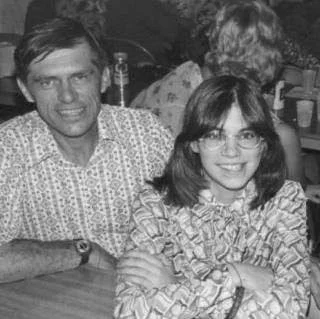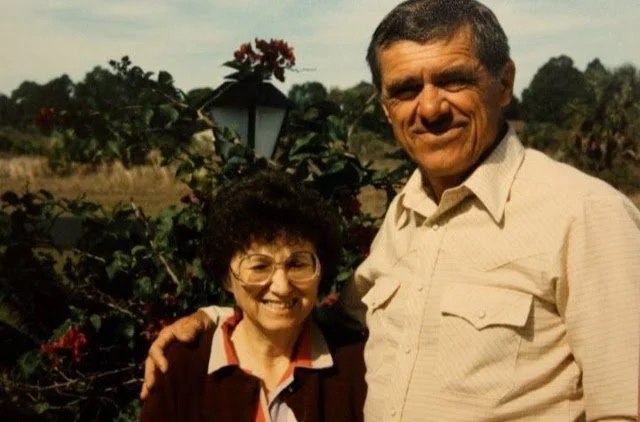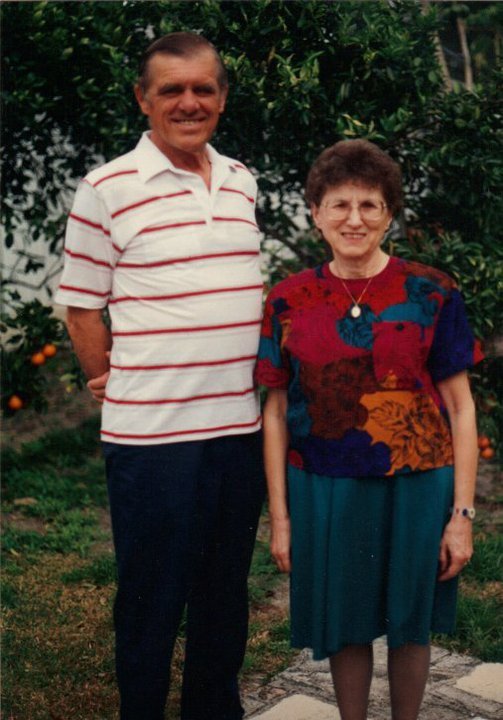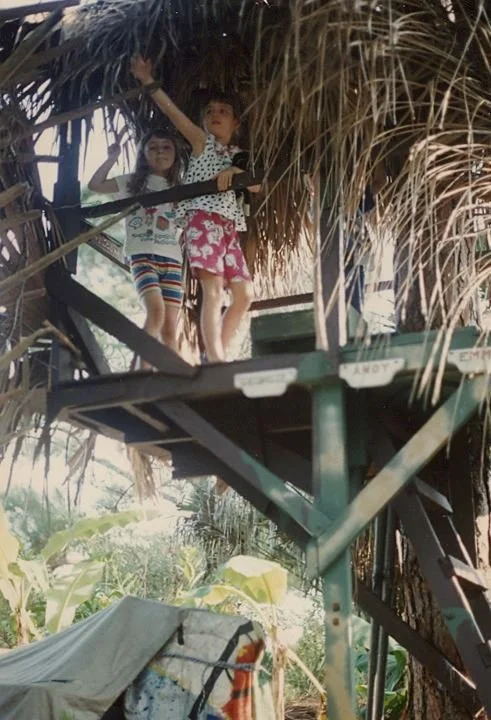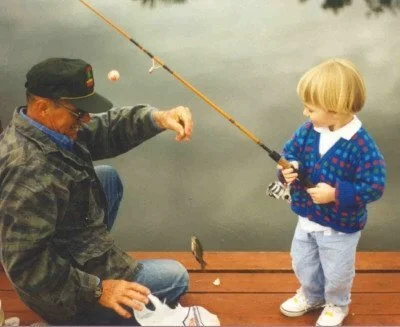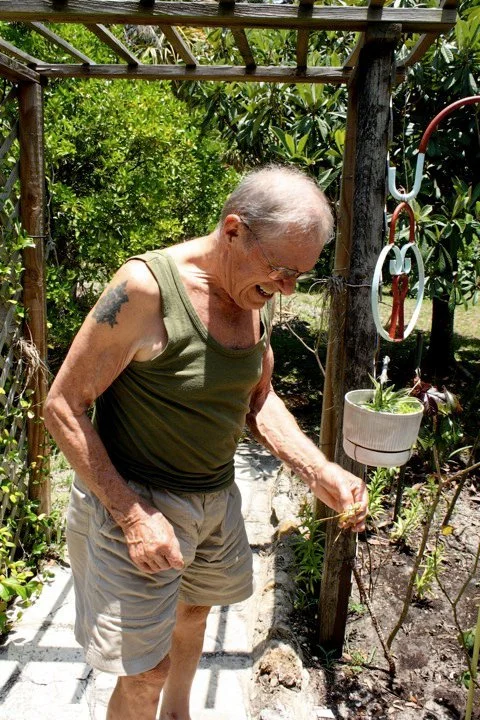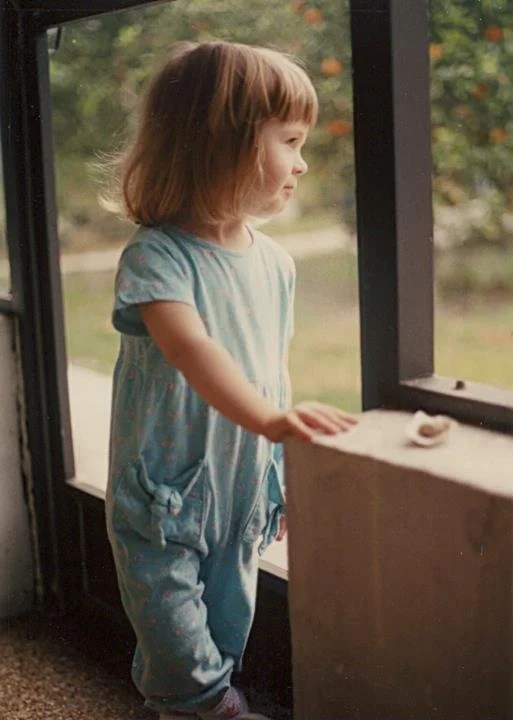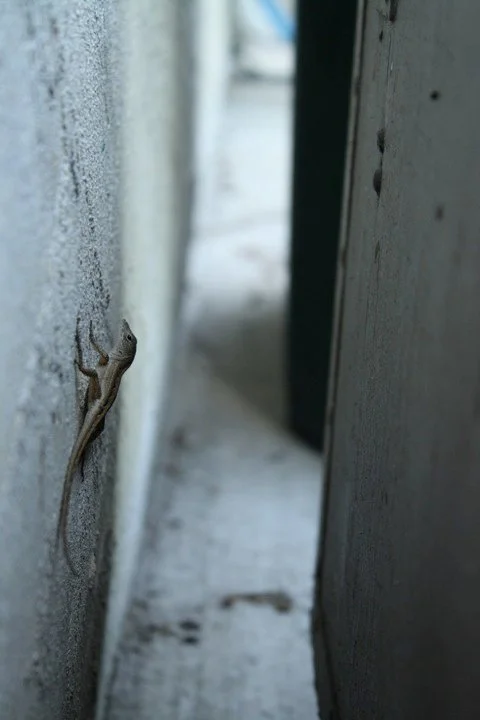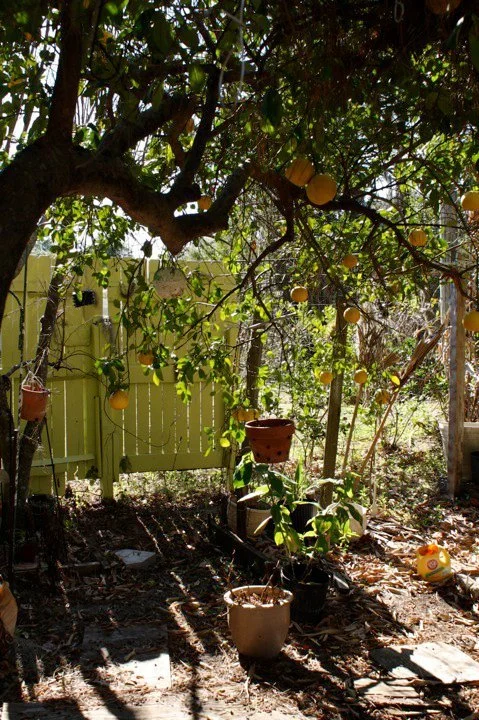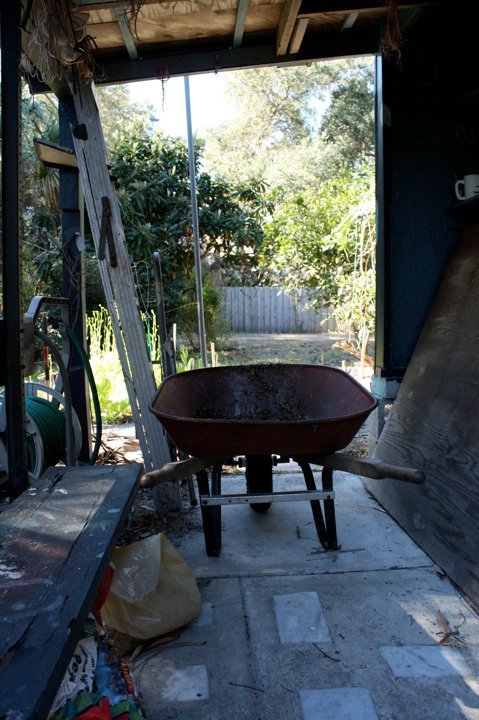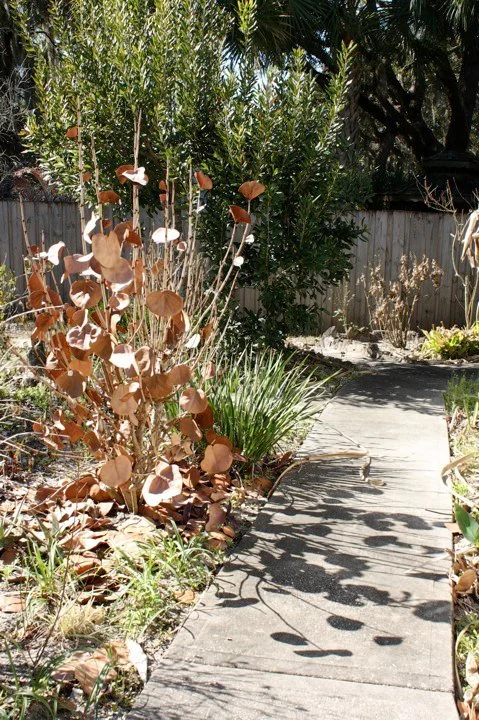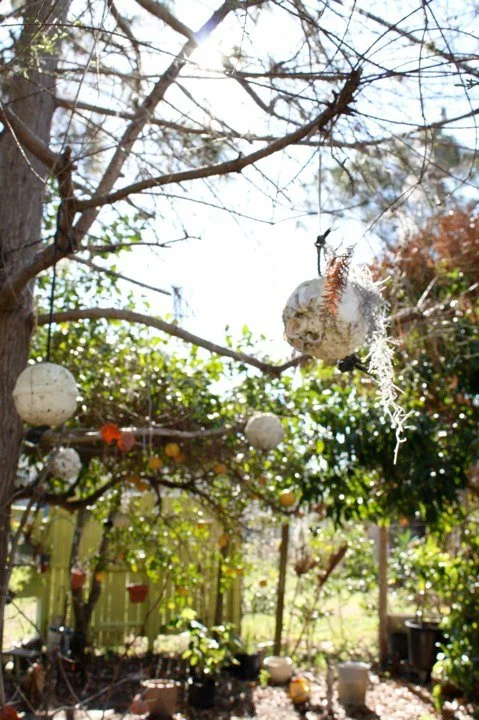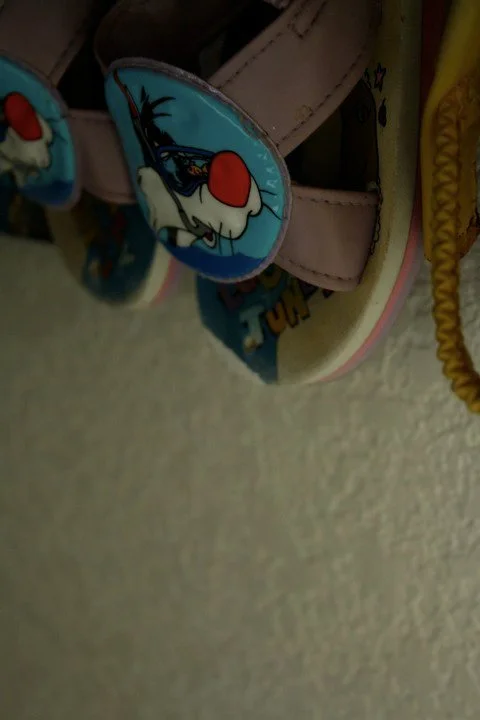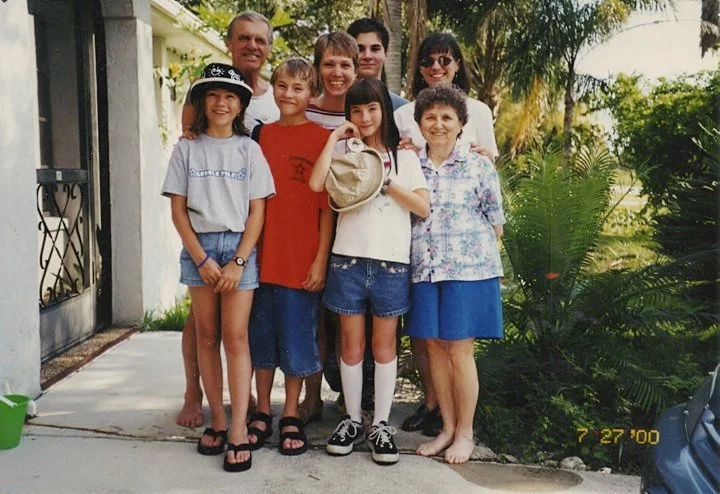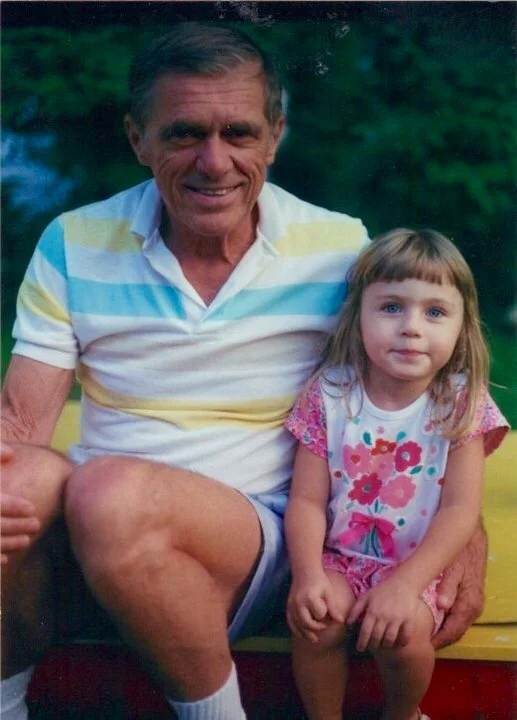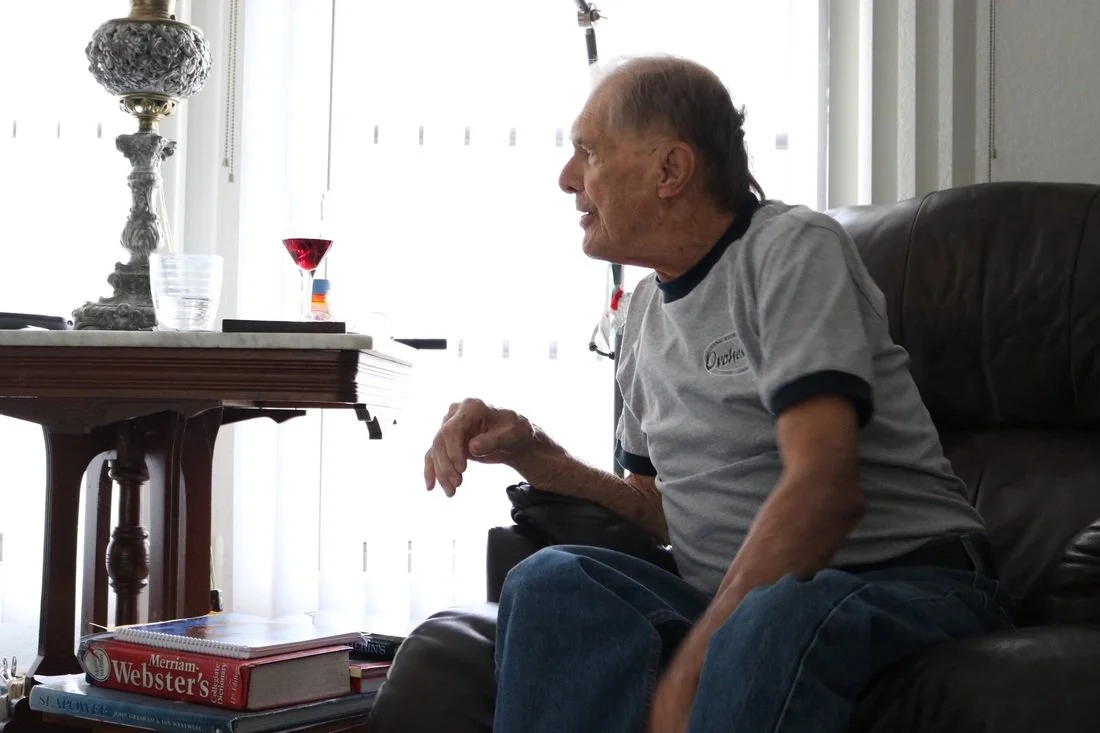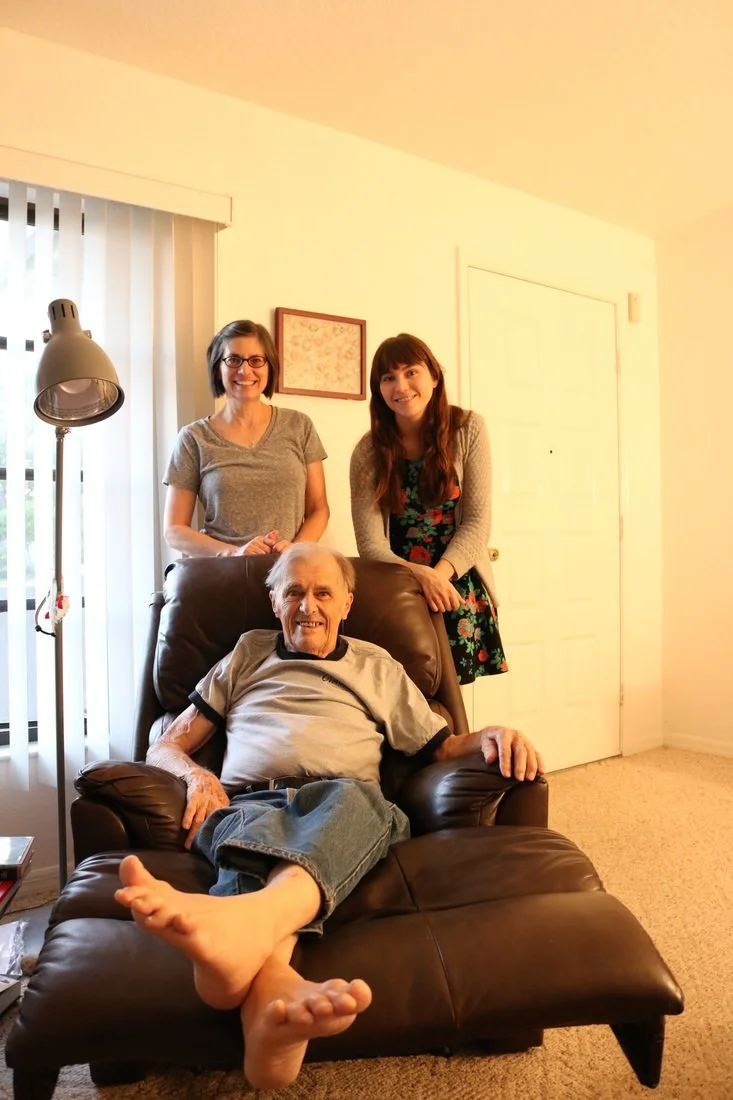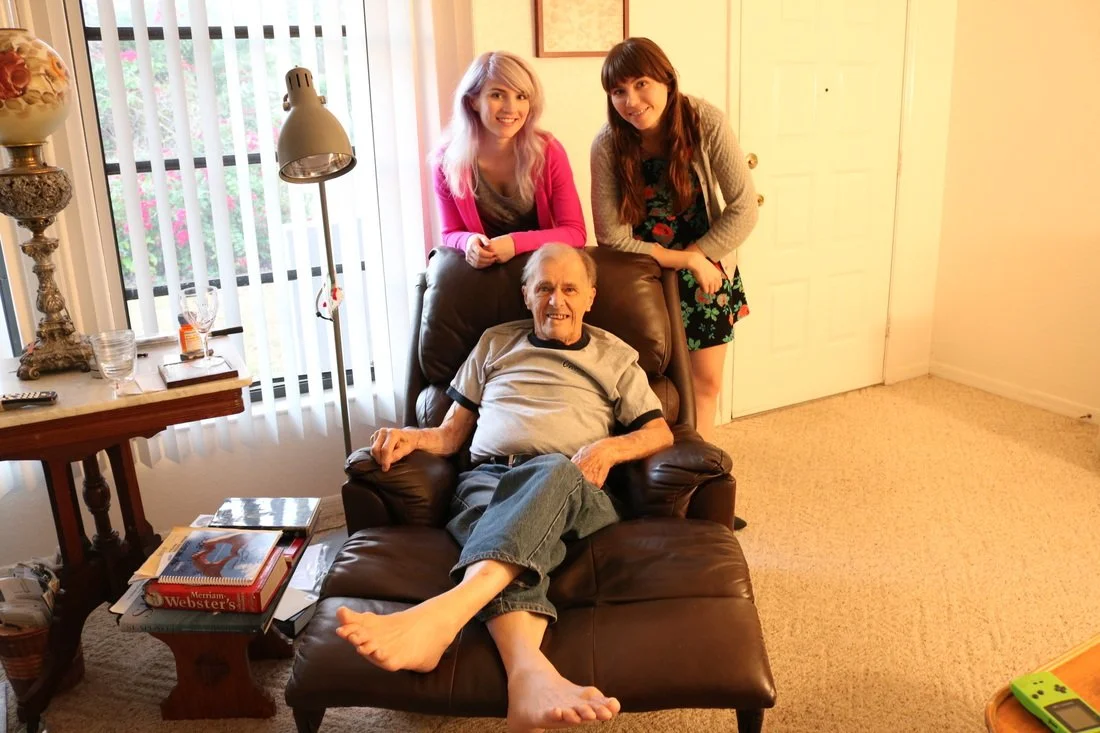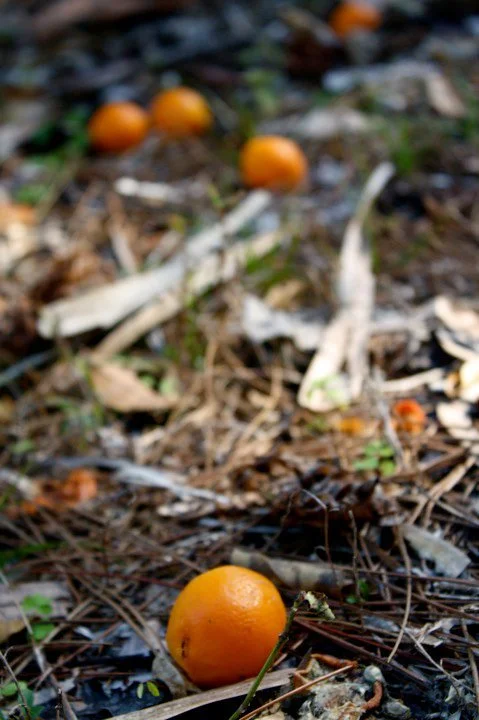Memories of Grandpa Andy, September 10, 1926 - December 5, 2016
I recorded this story, since it is quite a long one. Please feel free to listen.
[Edits: Grandpa's truck was white, not orange. Granddaughter, not niece, at end of recording.]
A week ago, my grandfather on my mother's side passed away. He was the most adventurous man I've ever known, always brimming with crazy stories whenever we spoke. He chatted with anyone, made everyone laugh, and inspired a positive spirit in all who knew him.
Grandpa Andy's life was a fascinating one. Over the last week, I have compiled as many memories of him as I can recall, many that I collected from others, and some that I gleaned from his memoir of his early adulthood. To family and friends, please let me know if you have anything you'd like added, or if there is anything that needs to be corrected.
The Onion Hater
My Grandpa Andy was born on September 10, 1926 in Reading, Pennsylvania. He grew up during the Great Depression, which instilled in him a sense of frugality that lasted all his life. We often heard stories about his lack of exposure to "exotic" foods because he had grown up in poverty. For instance, the first time he ordered a pizza, and carried it home vertically because he didn't know what it looked like. Or the time in Hawaii during World War II when he bit into a whole pineapple and wondered why it turned pink. Punch line: his mouth was bleeding.
His parents, Michael and Anastasia, were both born in Ukraine, and immigrated to the United States. They got married in Ohio during World War I, and started their family in Reading. Their neighborhood was a tight knit community of other families from the old country, and they supported each other as needed. At one point during his childhood, Grandpa Andy got sick and my great grandmother used an old tradition of laying onions on his chest to draw out the sickness. From then on, right on through old age, he hated onions, or "цибуля", with a burning passion. For instance, legend has it that during his time with the Coast Guard in WWII, he broke into his ship's kitchen in the middle of the night, stole all of the wretched onions, and threw them overboard. After that incident, he was allowed to cook his food separately from the rest so that it would not be contaminated with onions.
My Grandma Rose's sisters used to tease Grandpa about his hatred of onions, and they would try to convince her to sneak them into her cooking. But she knew better. The group would go round and round in debate about their value, or lack there of.
"Just put them in! You won't even taste them!"
"Then why put them in?"
"For the flavor."
"So you CAN taste them!"
At a certain point, everyone knew better than to bring up onions in Grandpa's presence, but it still crept its way into many conversations anyway. Every server who ever interacted with him got an earful about onions, too. He often said he was allergic to them. Another common topic of conversation was that he was a lefty. He sat on the left end of any table to avoid bumping arms, even if that meant he sat off to the side.
Andy Misura, on his way to Okinawa, Japan
The WWII Veteran
Grandpa Andy dropped out of school after finishing ninth grade. It was common back then for children to enter the work force early to help support their family. He held several factory jobs, including operating a drill press. He was 15 years old when Pearl Harbor was attacked, and he made good money at the pressed steel job because of the war effort. But he grew restless when all of his buddies had started enlisting. His older brother Mike was already in active duty.
He tried to register in the Navy, but due to an eye condition, he was rejected. Rather than go to the Army where his eye condition would not be an issue, he approached the Coast Guard. He had always loved boats and wanted to be at sea. So during the Coast Guard examination, he memorized the eye chart and successfully passed his physical. His parents were resistant to Andy leaving home for war, but he reasoned that the Coast Guard would be more comfortable than getting drafted into the Army and being sent to Europe to live in a cramped foxhole.
In his later years he said that most of all he remembered the “great chow” he had during war. Because he had grown up in poverty, he was only used to feasts during the holidays. But in the Coast Guard, they had dessert with every meal, and well-rounded plates that included vegetables, fruit, meat, milk, and salad. Training was hard however. In Virginia, they were even forced to enter water infested with jellyfish, because if they were ever forced to abandon ship, they could not be scared of jellyfish.
My grandpa’s specific position was Steward’s Mate, which many considered the best job on the ship because he was responsible for tending to the officers and keeping them happy. As a result, he got to eat what the officers ate and got more sleep than the rest of the crew. He respected his skipper, who was a lawyer back home, with an office in Manhattan. However, he wanted to be more “macho” and had his heart set on being the Fireman First Class, who manages the engine room. Toward the end of the war, his XO said that he would recommend him. He ended up serving as an Electrician’s Mate later on, helping check motors, engines, and batteries. He liked this much better than simply serving the officers because it felt more productive.
He spent his time on a Landing Ship, Tank (LST) for the duration of the war. From training, they went down to Florida, then to Louisianna, down to the Panama Canal, then up to San Diego and Los Angeles and finally to Hawaii. They did constant drills, which sometimes resulted in death. At the beginning of 1945, they learned that they were to head to Iwo Jima. They dyed all of their uniforms blue from white to help camouflage their convoy, and they spent the nights with blackout rules, so no lights were allowed topside.
On February 19, 1945, he saw battle for the first time as they invaded Iwo Jima. Grandpa’s LST carried Marines who were to go to shore. There was so much smoke when battle erupted that they couldn’t see anything on the shore except Mt. Suribachi. On the beach, the Marines lined up and advanced, and as men fell, they closed the gaps. The Marines had flame throwers and there were flames and explosions everywhere. Tracer ammunition lit up the sky. While their ship was beached, they would run the galley all day and night to help feed the Marines, many of whom were shellshocked. Grandpa went out with one of the Marines at one point, and witnessed the carnage on the beach. The images he saw stayed with him the rest of his life. This battle lasted almost a week before they backed off to their offshore positions. During this time, they often had to create smoke shields and use their strong antiaircraft capabilities to stave off kamikaze airstrikes.
From there, they went to Guam and then the Philippines. They spent months doing invasion rehearsals. And on April 1, 1945, they invaded Okinawa. They had all kinds of vessels attacking the beach, though a suicide plane destroyed one of the nearby LST’s. Two days into battle, they launched their landing craft tank, which took lots of maneuvering of oiled timbers. According to Grandpa Andy, it left the ship feeling empty. After several days of this, his ship flitted around between different areas of action. There were many suicide planes, one of which killed those aboard a huge cargo ship. In another attack, an American pilot took down a Japanese dive bomber that was headed for the LST's, and then flew amongst the ships in celebration. However, many of the men on board these LST’s panicked, thinking his plane belonged to the enemy, and they shot him down. My grandpa watched this happen in horror, and while his ship did not issue friendly fire, he still hated the idea that many had.
Two weeks into April, they headed to Guam. During this time, Grandpa Andy recognized his brother Mike’s ship, an Attack Cargo Auxiliary. Mike didn’t like that his kid brother was out in “hell’s half acre” while he had been at the rear for a large part of the war. He also didn’t like that my grandpa was part of the “Hooligan Navy” (the US Coast Guard) as a reserve while he was part of “the Big Outfit”, the regular Navy. Grandpa Andy's skipper gave him permission to visit his brother’s ship, and he was able to drink some fruit cocktail with his brother and his shipmates. However, while on his brother’s ship, they received word that they were "getting underway", and my grandpa’s shipmates did not appreciate having to haul back over to return him to the LST. He felt it was worth it to see his brother though.
Only a couple years after the war, Mike was working as a Merchant Marine. Off the coast of England, his ship hit rough weather and he was lost at sea. The tragedy of Mike surviving the war only to die during peacetime hit his family extremely hard.
In May 1945, Grandpa Andy and his ship crossed the Equator, and they had a line-crossing ceremony. One is considered a Pollywog before crossing the equator for the first time. Upon crossing, one becomes a Shellback. A sailor who had previously crossed the line played King Neptune. Grandpa’s early interest in music came up in this particular story. Throughout his time on the LST, there was a bugle on board that he used to "tootle" on, alone on the fan tail. He thought it was fun, and didn’t think anyone heard him doing it. But as part of the ceremony, they had him play the bugle. He did so, and after he was done, they turned the hose on him to show just how much his bugling annoyed them. But in his typical fashion, he took it all as good fun and was not offended.
They went through the Russell Islands next, then the Coral Sea, or “Iron Bottom Bay”, to Tulagi, and then to New Caledonia. During their time before returning to Guam, one of the guys suffered from appendicitis. As a Steward’s Mate, Grandpa helped prepare the wardroom to be an operating room with an operating table. He watched the operation take place from the serving window in the pantry, while the pharmacist administered ether using saturated gauze. The skipper even took an alternate course for smoother sailing. The sailor ended up making a full recovery in the sick bay.
There was word that they were to hit Kyushu next, the southern most island in Japan, but shortly after news of Japan's surrender spread. Grandpa Andy's ship was so excited that four guys threw a 20mm gun and its mount into the water. He recorded August 15, 1945 as the day war ended.
They were stationed at the Yokosuka Naval Base for quite some time, and that November, he visited Hiroshima with some of his crew. He said that the destruction was sad and appalling, and everyone was very quiet. He remembered five or six women at a table in front of a concrete building, who were rolling rice into balls. They served these to a line of people waiting for something to eat at the base of the stairs.
Just before Christmas in 1945, Grandpa Andy was given leave, and he went to see his brother Mike in the Oakland Naval Hospital. His gun had inexplicably gone off while he was on watch, and it went right through his hand. Grandpa snuck in a bottle of whiskey to "bring some joy into their lives” as he explained it, and they had a great time visiting. It was less than three years later that Mike was lost at sea.
The Sailor
Grandpa Andy continued on with the Coast Guard without being discharged for almost another year. He was stationed in the Puget Sound, then shipped off to Alaska for a while. From there, they were set to send him even further North, and issued him cold weather gear. Instead of complaining that he was long overdue for discharge, he collected as much cold weather gear as he could, understanding that it would be useful in the Northeast. He mailed it all home. He was finally able to convince personnel that he should be discharged on May 20, 1946. To put the request in, they had to give a reason for his discharge. The personnel officer lied and said Grandpa Andy was leaving to attend college at the University of Washington. When Grandpa worried that they would find out he hadn’t even finished high school, the man reassured him that no one ever checked. He was then free to return to Reading.
Grandpa spent a few more years at sea before settling down. He signed up for a special two year term with the Coast guard after he realized he would go mad if he had traveled that far just to work at a factory again. He signed up for the Naval reserves, and eventually the Korean War broke out. He somehow found his way back to Guam, though this time he was assigned to the engineer position on the admiral’s barge. This turned out to be a great deal for him. He was responsible for keeping the engines operating, but the admiral hated the barge so he had a lot of free time. Rather than sit around and be bored, he used a refurbished dingy to learn how to sail. Sailors on the floating Barracks and ships were jealous and they tried to hit him with potatoes whenever he sailed by. As he explained it, the potatoes “never connected.” He also spent a lot of time fishing, swimming, and tinkering with the fire pumps and diesels on the barge.
He was involved in a few missions and led repairs for some time, but sooner than expected he received “Glad Tidings” and was sent home. This was largely due to the fact that he had volunteered for active duty, while those who waited were sent home later. When he returned home, he started work at a clothing factory. Perhaps his original discharge papers that had claimed he was seeking a college education had gotten him thinking, but he took this time to enroll in night classes and earn his GED.
He went back to sea with the Merchant Marines, and sailed all over as an Oiler. He went back and forth to the Panama Canal, Guam, Hawaii, and Japan, almost as though he was retracing his steps during the war. Sometime during this period, Grandpa got a tattoo of a rose on his right shoulder. It was for my grandma Rose, his girl back home. The way he told it, the tattoo artist put the design much lower on his arm, despite Grandpa Andy's instruction, because he wanted his work to be more visible. Grandpa wiped off the design furiously and made him redraw it further up on his shoulder instead.
He eventually got tired of sailing and again went home. He wasn’t in a hurry so he elected to take a bus from Seattle to the East Coast, stopping in cities at his leisure. On the way, he happened to meet a student involved in the Forestry program at Paul Smith’s college. He learned about the program, and determined that this was his calling.
Andy and Rose Misura on their wedding day
The Student, Husband, and Forest Ranger
He met with the Dean of Paul Smith’s, Dr. Bruxton. While a GED was not enough for acceptance, he struck a deal with Grandpa Andy. He said that if he could do well in his first semester and pass a number of high school exams during the holiday break, he could stay. He was admitted under the G.I. Bill of Rights, which offered him a meager salary. While Grandpa studied, Grandma Rose would write him letters. He couldn't respond because he couldn’t even afford stamps, which were only a few cents back then. She took his lack of writing to mean that he might not be interested, so she told him straight up, "Just tell me and I'll stop writing." When she found out that he just didn't have any money, she decided to facilitate more consistent communication. Grandpa assumed she would send money (and maybe he could afford beer!) but she sent him an envelope filled with stamps.
By the end of the semester, Grandpa ended up on the Dean’s List and did wonderfully on his high school exams. During the time home in Reading, he began seeing my grandma Rose again, and they got married the next summer. Shortly after the wedding, they prepared to move to his apartment in the Adirondacks from Allentown, PA. My grandmother had never been on a long trip before, so an hour into the bus ride, when they had barely left the city, she asked if they were almost there. Grandpa told her they had at least another eight hours. This was to be the first in a lifetime’s worth of adventures with Grandpa Andy.
In the Adirondacks, Grandma Rose started work as a waitress behind the counter at a drug store in Saranac Lake. My mom was born in that town two years later. Grandma later worked as a secretary at a plumbing and hardware company, and then at the school my mom and aunt attended. Grandpa Andy got his Associate’s degree in the Terminal Forestry Program and won an award for “Best Utilizing Material Presented”. He worked with the U.S. Forest Research Station at Paul Smith’s for two years, then left for a higher paying position elsewhere that ended prematurely. Shortly after, he joined the New York State Conservation Department as a Forest Ranger, and eventually was promoted to District Forest Ranger. He spent his life advocating for the care of the environment, protecting forests from the spread of forest fires, and educating campers. He even traveled across the country to fight wild fires, and fostered friendships with fire fighters along the way. He had countless Smokey the Bear mementos, many of which have been passed down to my generation. He manned a fire tower for many years, watching out for columns of smoke that might indicate the start of a wild fire. Everyday he brought his lunch with him to work, and kept it cool by tying it up in a nearby stream.
Andy and his daughter, Mary Misura
The Father and Explorer
My mother Sharon was born on June 18, 1956, her sister Christine two years later on June 30, 1958, then the youngest, Mary, was born on May 26, 1960. My Aunt Christine was born with special needs, and she spent most of her life in a home specialized in accommodating her needs.
With a wife and kids, Grandpa Andy settled down a bit. He and grandma Rose would attend polkas quite regularly. Grandpa sometimes made up a lot of what he was doing, but he danced with enthusiasm and people loved it. One older woman, Fey, would sometimes ask to dance with him, despite Rose being his partner. He would lead her across the dance floor, sometimes guiding them through the circle of dancers and out of order. Fey always got a huge kick out of this. Grandpa taught himself how to play concertina and accordion. Touring polka bands often recognized him and invited him to come play with the band. Sometimes he would even go back to their motel room to jam.
Grandpa grew ever more resourceful as his life went on. When mom and Aunt Mary were young, he brewed his own beer in the basement of their house in rural South Otselic, NY. He was always a big fan of beer, and brewed root beer to keep the kids happy. Occasionally his system would get backed up and explode, and the basement would be covered in a sticky mess. The story always reminded me of the dad wrestling with the furnace in "A Christmas Story”.
Nearby, a textile mill produced tons of polyester printed fabric, and piles of scraps were left outside the facility. The girls collected the scraps and made a vast yo-yo quilt out of all the different patterns. I have had this quilt on my bed since college.
Grandpa’s love of the outdoors expanded wherever he went, and he took every opportunity to expand his experience. He learned how to fly planes and solo piloted in Cortland. He took up skiing, and worked as part of the ski patrol so that he could ski for free. In South Otselic, he often ice skated on the pond. One day, my mom wanted to skate but she was told no. So she stole his skates, shoved newspaper in the toes so that they would fit better, and went anyway. She sprained her ankle as a result. Some forty years later, Grandpa took us grandkids to a skating rink. I remember being surprised at how agile he was as he looped around the ice. However, as he was entering a spin, he toppled onto the ice. That was the first time I had ever heard of a “concussion”, and remember Grandpa sitting in his easy chair laughing the whole thing off later that day. He had an ice pack pressed against his head.
The snow there was neverending in Upstate New York, and despite this making for good skiing, it was a common source of grief. One time, Grandpa had bought an inexpensive car called a Scotsman, again reflecting his frugality. However, occasionally tightwaddery came with a cost. In this case, the car had few, if any, accessories. There was no radio, no functioning heater, and no windshield wipers. When it snowed, he had to continuously stop on the side of the road to wipe off the windshield by hand. But Grandpa had the patience for these kinds of things, and when he committed to something, he stayed with it. He often relayed the story of how he hated the idea of wasting his time on his drive from South Otselic to Cortland, so he would actually read while driving as if he was taking a bus. No one has any idea how he got much actual reading done this way, let alone how he avoided getting into an accident. Aside from this, Grandpa Andy was a good driver. He even gave my brother some of his first driving lessons - in a white pickup truck with a stick shift, no less. To this day, all members of my immediate family drive a stick shift.
While my parents were dating in the mid 70s, they would occasionally drive up from college to visit Grandma and Grandpa in South Otselic. During one visit, my dad was having trouble starting his car because it was so cold. Grandpa came out to help and remarked, "We live in a God damned frozen hell hole." This became a frequent refrain for my parents whenever they were bothered by the winter weather.
In 1976, Grandpa Andy worked at the Winter Olympics in Lake Placid. He met loads of interesting people and traded Olympic pins with them. Just like when he was about to be shipped off North while in the Coast Guard and he collected as much cold weather gear as possible, he kept all the gear from his Olympic employment. He got giant boots during that job, which were insulated with several inches of foam. These were later passed down to my dad when he and my mom settled down in Upstate New York, and my brother Andy and I always called them Grandpa's “moon boots”. We would slip our kid-sized feet into them and laugh because they went up to our knees, and this brought a whole new meaning to the phrase "having big shoes to fill". They were so big we could barely move with them on, but my dad wore them whenever he used the snow blower. My parents also received a 1976 Winter Olympics tote bag, which my mom used to carry her ice skates to and from lessons for many years.
Grandpa Andy and Grandma Rose returned to Lake Placid with my mom and I when I was 12. We spent a few days reviewing Grandpa’s old haunts and driving to the top of White Face Mountain. We stopped by the Olympic ice skating rinks and watched young skaters practicing their programs. We even took a trip to Paul Smith’s, where Grandpa was astounded by the vast library they had recently built on the campus.
The Florida Transplant
Grandpa Andy and Grandma Rose moved to North Port, Florida in 1980, long before strip malls and big box stores and snow birds invaded. Grandpa was in his early 50s and grandma was in her late 40s. They built a house with a lanai, and bought a few acres where Grandpa could build a garden. They enjoyed not having to shovel snow and worry about ice like in Pennsylvania and upstate New York. They went to the beach, took walks, attended polkas, and participated in strange activities, like watching the circus trucks come to town in Venice during the holidays. Grandpa enjoyed fishing on the canal across the street. He went to the beach with grandma, collected sharks’ teeth, and went snorkeling. They grew a rose garden out back. He got himself a Harley Davidson and took pleasure in riding it around town and fixing it up. He also bought a boat and spent a lot of time out on the water, much like he had in early adulthood. Perhaps his boat reminded him of the refurbished dingy he used in Guam during the Korean War 30 years before. Before retiring, he continued his work as a Forest Ranger on the flat Florida landscape, and worked not too far from home.
Back when Grandpa Andy had returned from World War II, he had regretted leaving high school early, thus his decision to earn his GED and eventually his college degree. This determined, studious nature continued throughout his life. While my grandma helped shelf books at the local library, she would check out nonfiction books about military history and bring them back home for Grandpa Andy to read. He read about the wars he had been a part of, those that came before, and those that came after. He read so many that they had to create a system so she could tell if he had already read one or not. Once he had completed a book, he would mark a designated page number with a circle. If my grandma later found a book that he might be interested in, she would first check if Andy had already read it. Sitting in his armchair, if he didn't recognize a specific word, he looked it up using the Webster's dictionary that he kept next to him at all times.
The Gardener
But by far, Grandpa’s most prized possession was his expansive garden, which quickly became home to all manner of fruit, flowers, and trees. There were banana trees on the side of the house. Pineapples, star fruit trees, grape fruit trees, and tangerine trees were scattered throughout. He even grew watermelons. Any extra star fruit my family could not consume he brought to the Ukrainian market in town. He always refused payment for these, and delivered them by the box load. Although his Ukrainian language skills were rusty, he enjoyed practicing at the market. He was unabashed if he made errors and knew that the best way to practice was to not be afraid of making a mistake.
In fact, Grandpa Andy was rarely concerned with how he came off to others, occasionally to a fault. For instance, one afternoon, he was cutting a path through the jungle using a machete. As he went, brambles, thorns, and twigs cut his skin, so by the time he had cleared his way to the road, he was covered in his own blood. It just so happened that the moment he came through the brush, two cops were driving by. Imagine seeing a tattooed old man stumble out of the jungle in a non-residential area, covered in blood, and carrying a machete. They pulled over and questioned him for several minutes before they were convinced that he was not a crazy machete murderer.
On another occasion, he was off duty when he noticed the start of a forest fire. He parked on the side of the road and found a way to alert the authorities so they could get it under control fast. When the first responders arrived, they were convinced that Grandpa Andy had set the fire himself and was trying to cover his tracks. They didn’t understand how he could have noticed it so quickly, until he explained that he was a forest ranger and that it was his job.
From left to right: Andy and Mary Misura, Andy Dunscombe, Sharon Dunscombe, Emily Dwyer, George Dwyer, and Rose Misura. North Port, FL. 1994.
The Grandfather
Between 1986 and 1990, the four grandchildren were born, the last of which was myself. My oldest cousin George was given Andrew as a middle name, and my brother Andy was of course named after Grandpa as well. Emily came next, and then I was born on Grandma Rose’s birthday, so my middle name is Rose. With each arrival, Grandpa Andy wrote their new grandchild's name and birth date into concrete on the back walk and lined each name with sharks' teeth that he and grandma had collected.
They took periodic trips up north to visit, and we would visit them in the spring. Eventually, my Aunt Mary moved down to Florida with my cousins, so trips down to Florida involved all of my mom’s side of the family. Once Andy and I were in school, we moved our annual trips to a three week period in July, which included two days there and two days back in the car.
Everyone who spent time with Grandpa got a kick out of this sense of humor. His laughter was infectious, and even if someone didn't understand why he thought something was funny, the fact that he found it so funny was enough reason to laugh. Other times, he would say something offhand to himself that wasn't necessarily meant as a joke, but the way he said it was so uniquely "Grandpa Andy". My dad distinctly remembers walking up to a store with his father-in-law, and Grandpa pulled out a roll of bills from his pocket. He held it in a fist in his hand, laughing at how thick it was, and said, "I've got a wad big enough to choke a horse!"
Grandma and Grandpa’s house was a magical place as a kid. When the kids were old enough, Grandpa built us a treehouse. It was the only treehouse in my childhood, and it was special because we could only climb it during our annual visit with Emily and George. Grandpa carved our names into the wood so that we knew it was for the kids only. Its roof was covered in palm fronds, giving it a very tropical feel. The ladder was rickety but it was always worth it once I got to the top and looked down at my parents below.
A couple times we visited Grandpa in the fire tower before he retired. I remember being scared of the stairs during the climb, because they were slotted, with gaps between each step, and I was worried I would fall through. I was amazed that one person could spend so much time so high up above the trees, and so isolated. It was like Grandpa's own tree house.
Me with my cousin Emily Dwyer in the tree house. 1995.
The Fisherman
There were many things about visiting with Grandpa as a child that enriched my understanding of the outside world. One such place was his favorite fishing spot across the street. When I was little, I was scared of the fish in the bucket jumping out at me, and always wanted to put them back once they were caught. They reminded me of the fish in our tank back home. Grandpa always helped me put any fish that I caught back in the water. If we caught something big, usually a sun fish, he would take it home and prepare it as part of a sandwich. I was never adventurous enough to eat these, but my brother enjoyed them. He also grew up to have the same taste in food as his namesake. We learned early on that Grandpa loved his food to be spicy. My mom told me that the more he ate spicy foods, the less he could taste the spiciness, so he would just make them spicier. In fact, he kept a bottle of tabasco and sometimes a container of chili powder on the dining room table and he doused everything he ate with them. One afternoon, grandma had made pancakes. I poured on some syrup and then sprinkled what I thought was cinnamon all over them. It was definitely not cinnamon. Meanwhile, my brother likes spicy food so much that he gave out personalized bottles of hot sauce as a gift at his wedding.
Back at the dock, when we were a little older, we spotted an alligator across the canal. We continued fishing for a little while, and eventually noticed it had disappeared. But within a few minutes, it popped its head out of the water only a few feet away from the dock. Grandpa rushed us away and told us that it was trying to sneak up on us. Another time, he brought us to a dock a little further away and we saw a porpoise for the first time. It was very friendly and dad took a picture of it poking its head out of the water and splashing in front of us. After it swam away, I remember walking along the rocks and collecting pointy fish vertebrae that had washed up on the shore.
Andy Misura and Andy Dunscombe at the canal, North Port, Fl. 1992.
The Musician
My grandpa's "concertina room” was another fascinating location. In it were cases and cases of concertinas and accordions that he had collected over the years. In the corner there was a display case filled with figurines playing concertinas. There were all kinds inside. A dwarf from Snowhite, creepy clowns, delicate rococo style porcelain cherubs. The thick carpet muffled the noise so his music didn't echo, but when Grandpa was playing, you could still hear it throughout the property. He always let me pick which concertina he should play, and I always gravitated toward a black and white one that had jewels as buttons. I have many precious memories of being taught how to play these instruments, and listening to him play extraordinarily complex songs by ear. He didn't need to read music to play it, so he didn’t. In fifth grade, I started learning how to play the clarinet. That summer, Aunt Mary gave me her wooden clarinet, which she had used in high school. I wasn’t like Grandpa, and needed sheet music to play, but he did a remarkable job harmonizing with the short little songs I had learned in band practice. He even gave me several pads of lined music paper that he had little use for, which I used the following year to write original compositions.
On the other hand, Emily had definitely inherited Grandpa’s ability to play by ear. She started learning to play the violin as a young student, and her ability to hear a note and play it, without having to see it written down, has come quite in handy throughout her music education and career. Grandpa and Emily spent many afternoons jamming together, fiddle and concertina playing off one another.
Emily Dwyer and Andy Misura jamming in the Misura house, North Port, FL. 2012.
The Lanai
The lanai was definitely my favorite place to spend time. The floor was made of little pebbles that tickled my feet, and colorful stamped glass shapes hung by the screens and sparkled against the leafy plants beyond. We often chased lizards along the gutter or behind the grill out back. The lanai was home to my favorite chair, which rocked forward and backward, making a slight creaky noise if I went too fast. I would sit in the chair all morning listening to my Walkman and coloring while Grandpa puttered in the garden. He wore knee-high boots, a wide-brimmed hat or bandana, and a long-sleeved shirt to protect from the sun and “skeeters”. I often saw him pushing a wheel barrow or carrying giant buckets of water. It was a full-time job. One time, he was out working in the yard when it started to sleet. It was the first time I had ever seen sleet, and I thought it was snowing at first. When we realized how heavy the ice was, we started shouting out to Grandpa to see if he was okay. There was a pause for a few moments and we thought maybe he had been knocked out. But then we heard his voice call out from the coverage of the shed, "Yooooohoooo!”
When I was four, my parents offered to take my brother and I to Disney World. But being the sensitive and frightened child that I was, I said would rather stay home because the giant characters walking around in costume made me nervous. It was around Easter when we were visiting that year, and that night, Grandpa told me that the Easter bunny was hopping around the backyard. Sure enough, while sitting out in the dark on the lanai with both of my grandparents beside me, I could just make out a white fluffy silhouette hopping around by the shed. The rabbit was most likely a lost pet looking for something to eat, but I honestly believed that we had caught the Easter bunny in action.
While packing for these trips, we were always instructed to include one pair of pants, sneakers, and a long sleeve shirt for playing in the backyard, even though it was typically 90 degrees or hotter. The mosquitos were relentless, and often bit us through our sleeves anyway. If the itching got bad, Grandpa would give us pink chamomile lotion to soothe our skin. He was no stranger to bugs after over a decade in Florida, and he executed them regularly using various methods. Perhaps his favorites to catch were "lubbers", a bright orange, yellow, and green insect resembling a giant grasshopper. These destroyed his roses, so he would violently rip them in half and throw them in the dirt. An hour later, they would be covered in ants. I was always horrified by this, but wasn’t sure whether the insects' presence or their violent deaths upset me more.
One thing I was sure of was that Grandpa Andy could handle anything. When I was four or five, perhaps the same trip when I had seen the Easter bunny, I was falling asleep when I felt something creeping around inside my sleeping bag. I looked inside and saw something black against the light pink lining. I called my parents, and they shook out the bag to prove there was nothing inside. To their mortification, a black scorpion spilled out. Out of nowhere, Grandpa Andy rushed in wielding only a flipflop. He smashed the scorpion without hesitation. The scorpion stung him on the hand before it died, but Grandpa was just relieved that it got him and not me.
The Collector
As the years went on, Grandpa Andy went for walks and acquired things that he might need one day. This again seemed to be a habit picked up during his youth, when he learned to salvage and not waste anything that might be useful. He assembled these things into piles, messes, and compositions, all of which represented Grandpa’s personality and values so keenly. In the garage, he hung a small collection of sandals left by the grandkids because their feet would outgrow them by the next summer. Andy’s were from when he was a baby, and they were simple and yellow. Mine were purple with Sylvester from Looney Tunes on the tops, from when I was a toddler. In the shed was an array of small plush and plastic toys found on the side of the road. On the one hand, this could be seen as creepy. On the other hand, knowing Grandpa, it was hilarious to consider what was running through his head each time he chose to pick these items up, bring them home, and display them. As a sentimental person, I could always relate to this practice, and often find myself collecting things from the side of the road that might otherwise end up in a landfill. However, because I do not have a massive yard to accumulate these things, I am often forced to throw them out in the end, but I understand the impulse either way.
Grandpa even collected dozens of white foam floats used for lobster traps that had washed up on the shore during a storm. He hung these from his tropical trees like ornaments. He erected found wooden fencing and posts and hung flower pots from them. In his later years, he collected mangled hubcaps and hung them from some other trees, the final piece to his lifelong series of found object art. I complimented this latest addition when I last visited, not just because they acted as giant sun catchers, but because I found it quite beautiful that he found it beautiful.
Amidst all these installations, he found places for various other projects. He had a deep pit in the ground that we were warned not to go near, a canister that he may or may not have burned trash in when they first moved to North Port, and a live trap that many of us begged him not to use. For a while he even raised tadpoles in big white buckets under the treehouse and taught us about how important frogs were to keeping bug populations at bay. We marveled at how little the tadpoles were in their various stages of growth.
The Correspondant
At bedtime, Grandpa would read us stories on the couch in the living room. There was one story in particular that he got a huge kick out of, called "Florence and Eric Take the Cake". In the climax of the story, a woman mistakes a fancy cake for her fancy hat, and when she realizes her mistake a little too late, she yells, "ARRRGGGH!". Grandpa thought the sound was so funny that he couldn't say it without bursting out laughing. He also spent a lot of time reading books from the library, playing a computer game involving a joy stick that simulated flying planes, and playing Tetris on his Game Boy.
While I was in college, he told me his Game Boy was acting up, so I sent him my old Game Boy Color so he could continue his evening Tetris ritual. He sent me the following thank you note, which contained his usual humor:
“Dear Hannah,
Thank you so much for the GAME BOY. I’ve been using it. It works like new which I’m sure it is.
My old one started to act old. The red lite which depicts the strength left in the batteries would blink for no reason. To me that indicated wear and seemed likely reason to bring on a complete breakdown in the near future. Then there was the inability to speed up the drop [he's talking about the Tetris pieces] which is what you called to my attention. Yeh, it was showing its age.
I will keep the old one as a standby and use the one you gave me.
I’ve enclosed some cash for you because I know how poor students are. There always seems to obtained seems to be something you need but do not have enough “dough” to buy it.
My mistake is attributed to my bronchitis affliction. Grandma and I both are fighting the illness. It keeps banging on. (I needed an excuse for my error so bronchitic sounds right.) IF I WAS NOT SICK THAT MISTAKE ABOVE WOULD NOT HAVE OCCURRED. (I think.)
We are so impressed w/ your artwork. There are so many who think they are artists but they and their work show they are “wannabes” (wannabes). You truly are blessed w/ talent in art. We love you, Hannah.
Granma & Granpa"
Reading this now, I note how keenly he was aware of students being poor. I now know that when he was first attending Paul Smith’s, he couldn’t even afford to send Grandma a letter. All through my college years, he was committed to sending me cash here and there so that I would have a smoother financial experience than he did sixty years earlier. After a visit in college, when I had shared some photos on my computer that I had taken with a digital camera, he was fascinated by how I didn’t have to develop them. A week later, I received a card with flowers on the front that contained the following note:
“Dear Hannah,
As you were leaving, I had intended to present you with the enclosed gift. Trouble was, I was filled with emotion seeing you and your parents leave. It wasn’t until you were long gone when I exclaimed to Granma how my memory is getting so bad.
All students are poor. This will help a little (very little).
You were so nice to take the time to show me how good it is to own those new electronic gadgets - Thank you.
Granma is so nice… she picked this card and found your address for me.
We both love you very much.
Granpa Andy
P.S. Granma thought you’d like the designs - simple & pretty."
Back, left to right: Andy Misura, Sharon Dunscombe, George Dwyer, Mary Misura. Front, left to right: me, Andy Dunscombe, Emily Dwyer, Rose Misura. North Port, FL. July 27, 2000.
The Later Years
As Grandpa got older, the doctor worried about him staying hydrated in the heat. He said that older folks don’t feel thirst as much as younger folks. Grandpa would start work in the early morning to avoid the hottest parts of the day, but even then it would get to be over 100 degrees by late morning. The doctor suggested he drink Gatorade, which would replenish his electrolytes, but of course, Grandpa didn't want to spend the money. So instead, the doctor gave him a recipe to make it himself. From then on, he drank a half gallon in the morning, and a half gallon in the afternoon. He affectionately called it "bug juice” and had it on hand at all times. When I was last down, he knew I had been doing a lot of running, so he wrote down the recipe for me (complete with a cartoon of him and Grandma), and gave me a sample. To me, it tasted better than the store bought kind.
But Grandpa Andy was the kind of person who never seemed to get older. Even though I could see the age in his face, he seemed invincible. As I got older, I went off to college and then got a job, and could no longer take time off to visit every year. Even when I made it down in 2010 and then in 2013, when Grandpa had just turned 87, he seemed strong as ever. While I was in college, I took a walk in his garden and photographed all of the little gadgets and dodats he had collected over the years so that I could better commit them to memory. I made note of the tally of backyard pests he had executed while they were destroying his plants. I saw the chairs he had stationed every so often in the back path so that he could sit down if he needed to rest. He joined me outside and proudly pointed out his last bananas of the season. They were way out back, high above a power line, hovering above the neighbor’s fence. Even then, he seemed so powerful. I couldn't imagine anything other than him puttering back there for hours on end.
In his 80s, Grandpa was diagnosed with Chronic Lymphocytic Leukemia. He battled it for years, though he hated the hospital. When I last visited him two weeks ago, I heard all kinds of stories about the horror of the hospital, and how it felt like being in jail. They had administrative control over everything, even using the restroom. Being contained in a sterile environment with never-ending blood tests and medications and inconsiderate roommates was not his style. He enjoyed the hustle and bustle of the hallway, and when his roommate insisted that the door be closed at night, Grandpa Andy set up two chairs, one for him and one for his feet, in the hallway. He spent the whole night out there with a couple pillows, and none of the nurses questioned this or tried to find a more comfortable place for him. During another stay, he set off for a walk without permission, went through a door and set off an alarm, and pretended it wasn't him. Someone asked, "Did you see someone go through here?" And he said, "Nope." He found a nicer waiting room on the other side with lots of good reading material.
But even in his illness, Grandpa Andy never abandoned his garden. It wasn’t until he was 89 and he was getting set up with a hospice nurse that he finally gave in to hiring a fellow to do some of the yard work for him. Even then, he still ventured into the yard to poison weeds and vines that were destroying his plants, and to pick fruit to share.
Grandpa Andy and I sitting on the sandbox in our backyard. Endicott, NY. 1993.
Our Last Visit
This year, I switched jobs and had a little more flexibility with my schedule during Thanksgiving, so I finally flew back down to visit Grandma and Grandpa, Aunt Mary, and my cousins after three years apart. With all of the memories I’ve shared swirling through my mind, returning to my grandparents’ house was like stepping back into some of the happiest days in my life. And while it was hard to see Grandpa struggle with nausea and explain that he could no longer play concertina because his fingers were too weak to press the keys, his ever explosive personality made it feel like old times. I treasured every minute. He joked constantly, even if he was in pain, for instance, telling me that he had gotten quite interested in solving crossword puzzles since grandma had taken them up. He then added, “We’re always solving problems, but it ain’t doing us any good!"
On Thanksgiving morning, Grandpa was feeling ill and was unable to come by Aunt Mary’s for Thanksgiving dinner. We were all sad that he always seemed to have complications when the family was gathered for a holiday. After dinner, George went to work at his restaurant, and Aunt Mary, Emily, and I went over to visit with Grandma and Grandpa and deliver leftovers. The timing ended up being perfect, because his anti-nausea and pain meds had just kicked in, so he was in bright spirits and no longer feeling ill. He excitedly presented us with two bottles of Merlot, which he teasingly called “Merlotte” so that we would correct him, only so he could yell, “I know! I know!” He joked that he had gotten one for himself, and the other for us girls. The more time that went by, the more joyful he became, which he openly contributed to his pain medications. He said that one of those made it feel like he had just consumed a six pack.
We chatted and discussed some of Emily’s music gigs and how things were going for her in Orlando, how George’s new job was going well, and eventually Grandpa suggested we open some of the “Merlotte”. We each sipped our wine, and then I video called my parents so that we could all spend some time as a group. Grandpa was perplexed by seeing my mom’s face on the phone screen, and at first thought we were playing trick on him and that we had recorded her earlier. But when she responded to his questions and they got to talking, he enjoyed the setup quite a bit. We discussed the holiday and how he was feeling, Grandpa had me walk the phone over to the window to show them part of the garden he was working on, and then he insisted I show them our empty wine glasses while he exclaimed in the background, “The girls are drunk!” And while he was unable to enjoy his leftovers that day, a few days later he felt well enough to eat some pie and other foods, so he still had a taste of Thanksgiving.
A couple days later, Grandpa was telling us about his preference of key limes to regular limes and lemons. The other two were perfectly fine, but there was nothing like a good key lime. He grew more than he knew what to do with out back, and used them to flavor his Gatorade. That explained why I preferred his Gatorade to the store bought kind. He gave some key limes Aunt Mary, and she had some displayed in a bowl in her dining room. He thought for a minute about why key limes were so superior, and said simply that he found the taste "more delightful."
Nine days later, on December 5, 2016, Grandpa Andy passed away.
I believe he was blessed because he didn't spend too long feeling weak and tired and frustrated that he could no longer approach life with the same vigor that he had maintained over the last ninety years. My mom flew down shortly before and Emily visited again, so he was able to spend time with his wife, his daughters, and his granddaughter in the days leading up to his death. He spent the last week of his life in comfortable hospice care, where he was even able to sit in the sunshine outside his room for a short while. He soaked up the Florida rays to the end of his days.
We miss him dearly, and my heart hurts each time I think about him and his continuous laughter and onslaught of stories being gone from the world. But I find comfort in knowing that he shared those things with me so deeply in life. He brought his unique ways of experiencing the world to so many, and he lived his life to the fullest he possibly could. If he had to do it all over, he wouldn’t change a thing. He said so himself in his memoir.
Andy Misura sitting in his armchair on Thanksgiving. November 24, 2016.
Grandpa Andy's Gatorade recipe.
His Legacy
During one of my last conversations with him, I asked about the status of all the fruits in his garden, including my all-time favorite, tangerines. He told me that they were still flourishing, but that they were too high to reach and he could no longer go up on his ladder to pick them. There was a twinkle in his eye that suggested he wanted to go up on his ladder anyway, but he knew better than to say this aloud.
After I said my goodbyes and shared hugs and Aunt Mary and I pulled away from the driveway, I looked out and spotted the tangerine tree out front, dotted with bright orange fruit at the very top. And on the ground, at the foot of the tree, was a single tangerine that had just dropped from the top.
A lot of years and work went into the curation and upkeep of that garden. Grandpa enjoyed nurturing his plants, and he gave away all that he could. To me, it felt like that tangerine tree was an extension of Grandpa Andy, and even if he was in poor health, his trees would always do what they were grown to do, and share their fruit. After all, Grandpa’s fruit trees are part of his legacy. He planted them, protected them, lived off of them, and shared their fruit with his family and friends and community. Those trees will continue to grow and flourish and drop fruit for others.
So here's to grandpa Andy. Who never said no to an adventure. Who gladly volunteered to fight during wartimes and worked tirelessly to make a difference in the world. Whose love for his wife and his children and their children knew no end. Who is the origin of all these stories and memories, and who shared them with us over the course of our lives so that we could learn from them and continue our family's oral history when he was gone.
My grandfather was much like his key limes. He made all of our lives more delightful.


